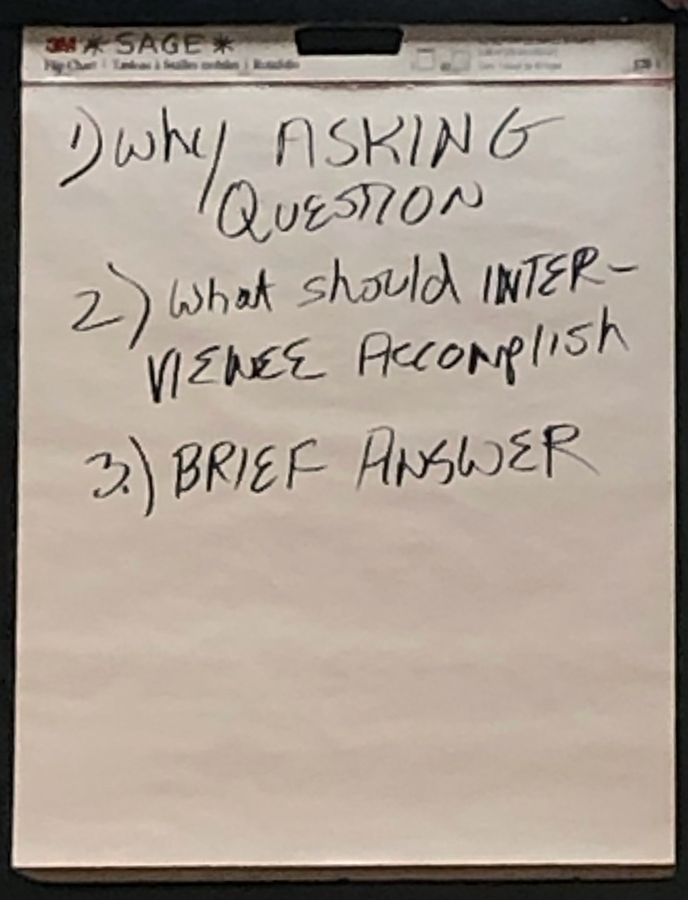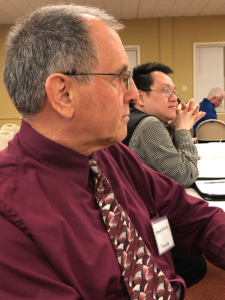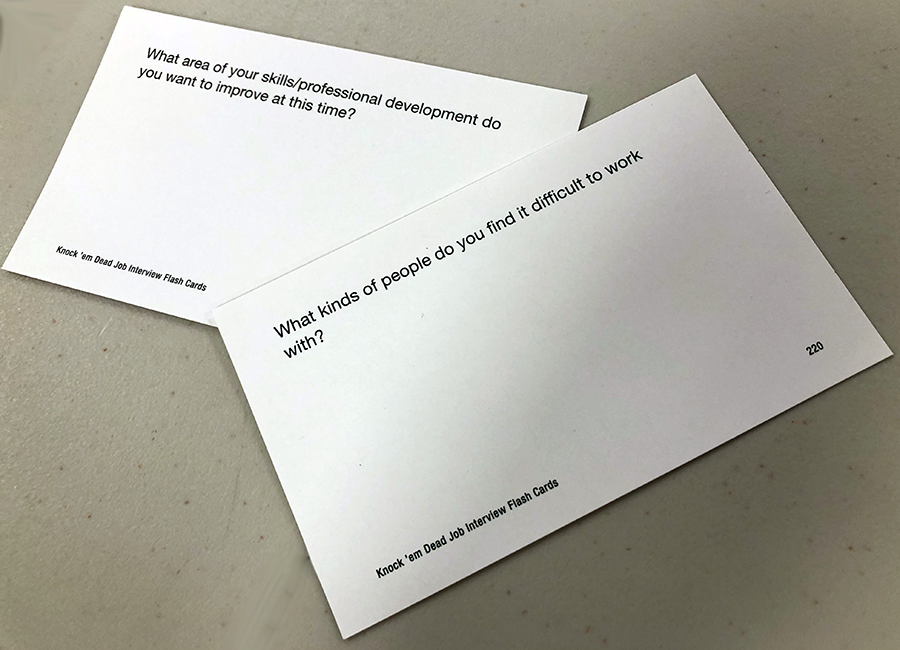This post is a recap of the December 16, 2019, Hudson Job Search presentation.
Nestled away in a well-appointed and comfortable meeting room in Hudson’s Christ Church Episcopal church is a gem for job seekers – the Hudson Job Search. About two dozen professionals of all ages and a cross-section of industries, gathered on Monday, Dec. 16 from 7-9 pm to participate in an interactive interview questions exercise, led by Hudson Job Search president Jim Ahern.


The Game:
The session was a bit like a career “Jeopardy” game, where each job seeker received a Knock ’em Dead job interview question to contemplate and determine three things about it:
- Why is the interviewer really asking the question? What is the motivation behind it? What do they want to know?
- What should the interviewee accomplish by answering?
- How would the interviewee answer?
Pairs of jobseekers worked together on their respective questions to think through and discuss what the interviewer was looking for, and then test their answers with their partner.

Attendee Mike D’Amico described the session:
“Tonight’s meeting emphasized the importance of knowing potential interview questions, understanding why an interviewer is asking the questions, preparing answers that represent your unique situation as a job seeker, and practicing these answers prior to interviews. Materials are available to help the job seeker through this process. Preparation is key to successful interviewing.”
When the partner exercise was completed, Jim hosted a round-robin discussion where each job seeker shared their question and divulged their thoughts on points 1, 2, and 3 from above. Then, and only then, job seeks turned over their card to read the recommended answer.
The enlightened responses added a diverse perspective beyond the rote answers interviewees oftentimes get caught in and threw out many assumptions they may make in an interview setting.
Here are a few interesting questions and responses:
Q1. What area of your skills/professional development do you want to improve at this time?
Why they are asking: To determine if you are willing to take on new skills and learn new processes or are you adverse to change. The interviewer also may want to gauge your honesty and self-awareness (no one is perfect at everything!)
What you want to accomplish: To find out if the job description allows you room to develop expertise or add new skills.
The best answer approach: Connect your answer to the types of advanced learning you feel will benefit the company the most and help you add value to that specific job. Value is more important than the tasks accomplished.
Q2. What kinds of people do you find it difficult to work with?
Why they are asking: To find out if you are a good cultural fit, how easy you are to get along with or have biases that would severely impact your ability to perform and to find out how you go about problem-solving.
What you want to accomplish: Show your acceptance of diverse people and work styles while indicating what motivates your work habits and relationships. (Perhaps you don’t like laziness and challenge others to rise to peak performance. That can be a positive, as long as it does not negatively impact the team dynamic.) What new skills/ideas do you bring to the table that other candidates cannot offer?
The best answer approach: Show your value to the team unless the job is one that is a solo practitioner where autonomy is critical. How will your participation enhance the team?
Q3. Tell me about a time when something went wrong?
Why they are asking: Looking for how you work under pressure, are self-aware or blame others for your mistakes.
What you want to accomplish: Use the STAR approach and tell a story: S = Situation; T = Tasks; A = Action; R = Results. Focus your answer on the resolution NOT the problem. What was the outcome? What did you learn? Turn lemons into lemonade and never, ever throw supervisors or coworkers under the bus!
The best answer approach: Be human, admit mistakes, and express solutions and learning outcomes.
Q4: What achievements are you most proud of?
Why they are asking: The interviewer wants you to open up and get a true sense of your personality. Allowing you to really tell a story about your accomplishments is a more interesting narrative and you will likely get in the groove to be more natural, turning the interview into a warm, welcome conversation.
What you want to accomplish: Let your light shine! This is a perfect time to let the real you show through the preparation and process while giving credit to others who share in your success.
The best answer approach: Show you are a team player and do not take sole credit for successes.
Q5: How much money do you want?
Why they are asking: To weed people out that are simply too expensive for the allocated compensation budget and to see if you have prepared and have a realistic view of the monetary value of the job.
What you want to accomplish: You need to do your homework and have a suitable market range ($20-30K range typically) in mind for this or similar positions and let them know what you would expect/accept. While no one wants to be first to put a number on the table, you don’t want a stalemate to occur because you are too stubborn to discuss compensation. Three main tactics can be used in this situation: 1) Tell them that you would expect the offer to be “fair and equitable” to both parties; 2) Ask them to give YOU the range they are offering; 3) consider saying something like: “According to the market research I have done on similar positions in this area, I would expect the range to be x to x.”
The best answer approach: Give a range. One option is to write down three numbers for yourself. The first is the least you would accept. The second is what you would consider a “fair” offer. And, the third would be heaven on earth. Then create a range that includes only options 2 to 3 and use that as your answer.
Q6: Describe the best or worst manager you’ve ever had.
Why they are asking: To determine your emotional intelligence. How articulate, considerate, professional and understanding you are. How well you can communicate difficult topics.
What you want to accomplish: Stress your high emotional intelligence, ability to empathize with many types of people, and your willingness to openly communicate with those whose work styles differ from yours. Turn any negative into a positive and explain what you learned from it. One example could be: “Working with a very process-oriented manager, I learned that if I and my teammates focused on ensuring the process was upheld to a ‘t,’ our manager welcomed a more creative end result. However, if we dismissed the prescribed process in favor of just doing it our own way, the entire project derailed, and we could not make our deadlines. So, sticking to a process actually gave us more flexibility and creativity, not less.”
The best answer approach: Show you can learn from everyone and you are keen on process improvement. If answering about the best manager, demonstrate how you used some of the approaches that person taught you with your staff and explain the resulting successes.
Top Takeaways:
-
Equal Partnership.
Having a team approach with a partner to challenge your answers to potential interview questions is a great training exercise. Imagine that partner (who may see things differently than you) as your competition for a job. Are you taking the time to look at interview questions from multiple angles outside your comfort zone? People in wildly different industries with very different backgrounds can help you expand your view. This helps both people grow in their interviewing capabilities.
-
Quiet Moments.
All too often, interviewees are uncomfortable with silence and may tend to ramble to fill what is perceived as an awkward pause. But taking a few seconds to consider points 1 and 2 above before responding can show the interviewer you are thoughtful and less scripted than others.
The final word
Create a cheat sheet for each job you apply to that includes these interview questions and your anticipated responses. The preparation will give you the ammunition you need to succeed. Ask a friend or family member to quiz you and practice your responses. With this approach, you have a much better chance of being confident, candid, and conversational!
Save the Date for the Next Hudson Job Search Meeting!
Hudson Job Search meets the first and third Monday evenings at Christ Church Episcopal, 21 Aurora St. with sign-in and networking at 7:00 – 7:30 p.m. The meeting is from 7:30 – 9:00 p.m. All our events are free of charge and open to anyone who lives and works in the greater NEO area, whether you currently have a job or not. No need to register in advance, but seating is limited to approximately 40 individuals. Please dress business casual. Park behind the church and come to the Parish Hall. Visit our Events link for upcoming meeting topics.

